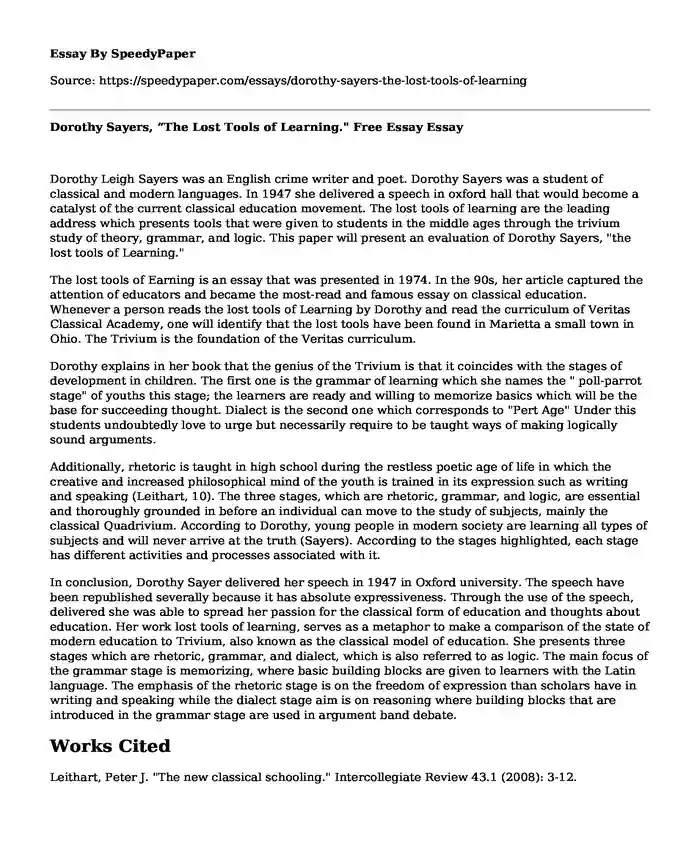Dorothy Leigh Sayers was an English crime writer and poet. Dorothy Sayers was a student of classical and modern languages. In 1947 she delivered a speech in oxford hall that would become a catalyst of the current classical education movement. The lost tools of learning are the leading address which presents tools that were given to students in the middle ages through the trivium study of theory, grammar, and logic. This paper will present an evaluation of Dorothy Sayers, "the lost tools of Learning."
The lost tools of Earning is an essay that was presented in 1974. In the 90s, her article captured the attention of educators and became the most-read and famous essay on classical education. Whenever a person reads the lost tools of Learning by Dorothy and read the curriculum of Veritas Classical Academy, one will identify that the lost tools have been found in Marietta a small town in Ohio. The Trivium is the foundation of the Veritas curriculum.
Dorothy explains in her book that the genius of the Trivium is that it coincides with the stages of development in children. The first one is the grammar of learning which she names the " poll-parrot stage" of youths this stage; the learners are ready and willing to memorize basics which will be the base for succeeding thought. Dialect is the second one which corresponds to "Pert Age" Under this students undoubtedly love to urge but necessarily require to be taught ways of making logically sound arguments.
Additionally, rhetoric is taught in high school during the restless poetic age of life in which the creative and increased philosophical mind of the youth is trained in its expression such as writing and speaking (Leithart, 10). The three stages, which are rhetoric, grammar, and logic, are essential and thoroughly grounded in before an individual can move to the study of subjects, mainly the classical Quadrivium. According to Dorothy, young people in modern society are learning all types of subjects and will never arrive at the truth (Sayers). According to the stages highlighted, each stage has different activities and processes associated with it.
In conclusion, Dorothy Sayer delivered her speech in 1947 in Oxford university. The speech have been republished severally because it has absolute expressiveness. Through the use of the speech, delivered she was able to spread her passion for the classical form of education and thoughts about education. Her work lost tools of learning, serves as a metaphor to make a comparison of the state of modern education to Trivium, also known as the classical model of education. She presents three stages which are rhetoric, grammar, and dialect, which is also referred to as logic. The main focus of the grammar stage is memorizing, where basic building blocks are given to learners with the Latin language. The emphasis of the rhetoric stage is on the freedom of expression than scholars have in writing and speaking while the dialect stage aim is on reasoning where building blocks that are introduced in the grammar stage are used in argument band debate.
Works Cited
Leithart, Peter J. "The new classical schooling." Intercollegiate Review 43.1 (2008): 3-12.
Sayers, Dorothy Leigh. The lost tools of learning. GLH Publishing, 2016.
Sayers, Dorothy Leigh. The lost tools of learning: Paper read at a vacation course in education. Methuen, 1947.
Cite this page
Dorothy Sayers, "The Lost Tools of Learning." Free Essay. (2023, Feb 10). Retrieved from https://speedypaper.net/essays/dorothy-sayers-the-lost-tools-of-learning
Request Removal
If you are the original author of this essay and no longer wish to have it published on the SpeedyPaper website, please click below to request its removal:
Popular categories





